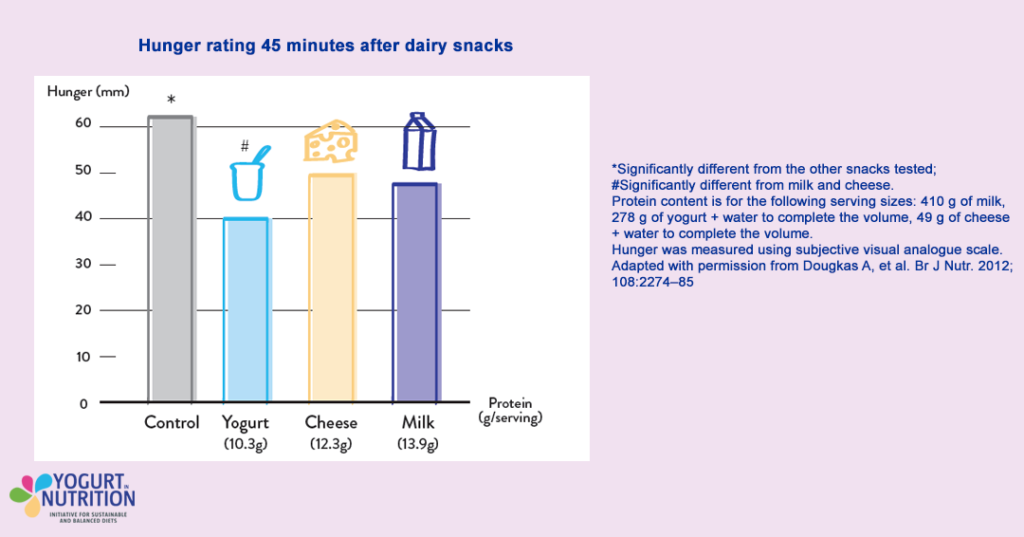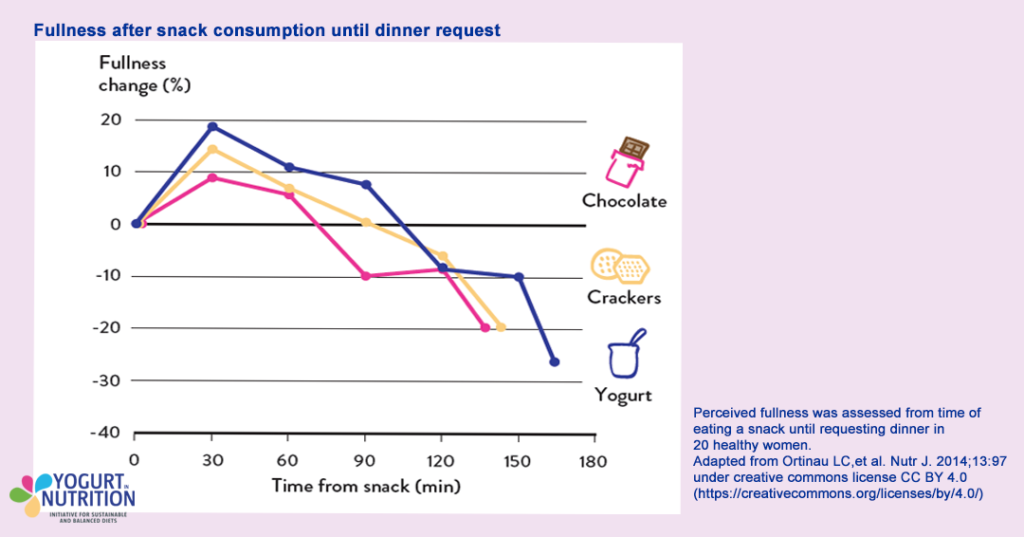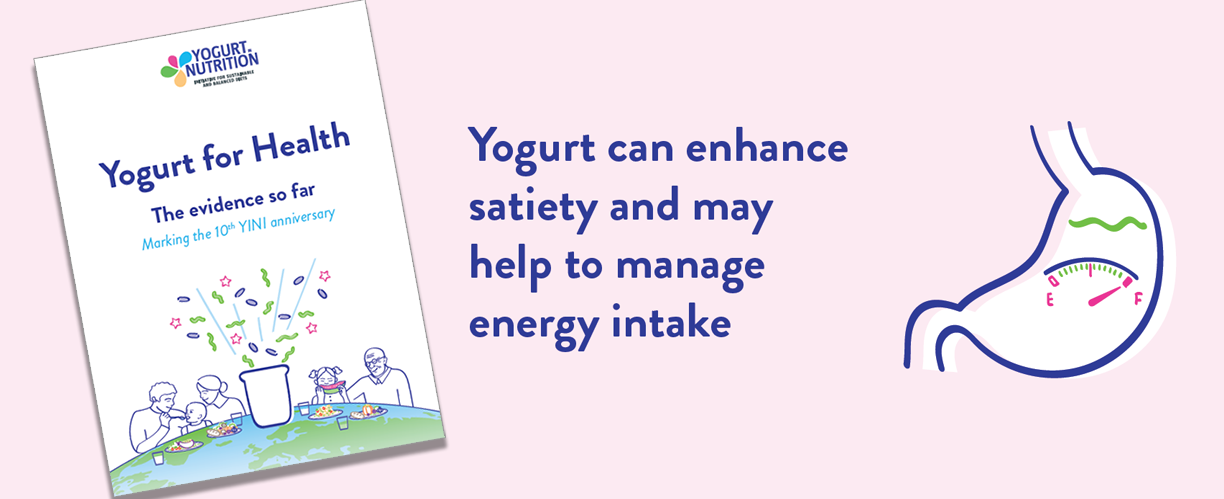Consuming yogurt can increase satiety – the feeling of being full – which in turn may help reduce energy/food intake.
Yogurt consumption reduces the feeling of hunger more than other dairy products
Greater appetite suppression is seen with yogurt than other dairy products.
Hunger was 8% lower when participants consumed yogurt as a mid-morning snack than when they ate a portion of cheese matched for energy content and volume.
In one study, hunger was 10% lower after a yogurt snack than after a matched serving of milk and 8% lower compared with a matched portion of cheese.
In another study, appetite and subsequent energy intake were reduced most after yogurt and cheese, but only yogurt reduced appetite more than milk in young adults (aged 20–30 years).
In a study of children (aged 9–14 years), Greek yogurt and cheese snacks reduced average appetite compared with a low-fat milk snack.
However, similar appetite suppression and subsequent food intake were obtained after consumption of Greek yogurt or a cultured coconut-based product for breakfast.
Low-fat yogurts increase feelings of fullness more than fruit-based drinks
Higher satiety ratings were seen following consumption of low-fat yogurts in a study comparing them with fruit drinks containing the same amounts of calories.
Yogurt containing peach – whether eaten with a spoon or in drinkable form – was more satiating than a peach-flavoured dairy drink and a peach juice drink: both the yogurts were associated with less hunger and higher fullness ratings.

“Yogurt is a high protein, low energy density food associated with greater appetite suppression than other dairy foods. This may help to regulate energy intake when it is eaten as a snack.”
High-protein yogurt could be a healthy replacement for high energy-dense snacks
Consuming yogurt as a high-protein, less energy dense snack instead of high-fat snack foods may improve appetite control and satiety and reduce subsequent energy intake.
Women participating in a study were less hungry after consuming a mid-afternoon snack of high protein yogurt than after consuming high-fat crackers or chocolate matched for energy content. Despite having the same energy content as the high-fat snacks, yogurt delayed the participants’ desire to eat the next meal by around 30 minutes. Moreover, the women consumed around 100 fewer calories in a subsequent meal after consuming yogurt than after eating crackers or chocolate.
Among healthy young men, a yogurt drink taken as a mid-afternoon snack induced a greater feeling of fullness in the hour before a meal than a chocolate bar of the same energy content.

How might yogurt exert its satiating effect?
Several factors may account for the satiating properties of yogurt, including nutrient content and effects on appetite-regulating hormones.
- The high protein content of yogurt could partly account for the higher satiety effect of yogurt seen in these findings.
- Protein ‘preloading’ – in which small amounts of protein are eaten at a set time before a meal – enhances satiety and reduces appetite by slowing stomach emptying and direct communication with the brain’s appetite-regulation centre.
- Other factors that may influence the satiating effects of yogurt include its energy density, the way it is consumed (with a spoon or drunk), and its rate of passage through the digestive tract. The potential effects of fermentation may also play a role.
- Yogurt may influence appetite-regulating hormone release in the gut.
- Yogurt consumed before a meal stimulates metabolic responses leading to reduced premeal appetite, later food intake, and post-meal glycaemia.
“Yogurt, thanks to the presence of high-quality amino acid pattern, promotes satiety and reduces energy intake. Increased acidity during fermentation positively affects calcium absorption; increased calcium bioavailability plays an important role, especially in low-calcium consumers, in the control of blood glucose and energy metabolism.”
References:
- Dougkas A, Minihane AM, Givens, DI, et al. Differential effects of dairy snacks on appetite, but not overall energy intake. Br J Nutr. 2012;108:2274–85.
- Tsuchiya A, Almiron-Roig E, Lluch A, et al. Higher satiety ratings following yogurt consumption relative to fruit drink or dairy fruit drink. J Am Diet Assoc. 2006;106:550–7. 96.
- Chapelot D, Payen F. Comparison of the effects of a liquid yogurt and chocolate bars on satiety: a multidimensional approach. Br J Nutr. 2010;103:760–7. 97.
- Ortinau LC, Hoertel HA, Douglas SM, et al. Effects of high-protein vs. high-fat snacks on appetite control, satiety, and eating initiation in healthy women. Nutr J. 2014;13:97. 98.
- Vien S, Fard S, El Khoury D, et al. Age and sex interact to determine the effects of commonly consumed dairy products on post-meal glycemia, satiety, and later meal food intake in adults. J Nutr. 2021;151:2161–74. 99.
- Gheller BJF, Li AC, Gheller ME, et al. The effect of dairy products and non-dairy snacks on food intake, subjective appetite and cortisol levels in children: a randomized control study. Appl Physiol Nutr Metab. 2021;46:1097–104. 100.
- Mather K, Boachie R, Anini Y, et al. Effects of cultured dairy and nondairy products added to breakfast cereals on blood glucose control, satiation, satiety, and short-term food intake in young women. Appl Physiol Nutr Metab. 2020;45:1118–26.101.
- Baspinar B, Güldaş M. Traditional plain yogurt: a therapeutic food for metabolic syndrome? Crit Rev Food Sci Nutr. 2021;61:3129–43. 103.
- Eales J, Lenoir-Wijnkoop I, King S, et al. Is consuming yoghurt associated with weight management outcomes? Results from a systematic review. Int J Obes (Lond). 2016;40:731–46. 104.
- Sayón-Orea C, Martínez-González MA, Ruiz-Canela M, et al. Associations between yogurt consumption and weight gain and risk of obesity and metabolic syndrome: a systematic review. Adv Nutr. 2017;8:146S–54S.



